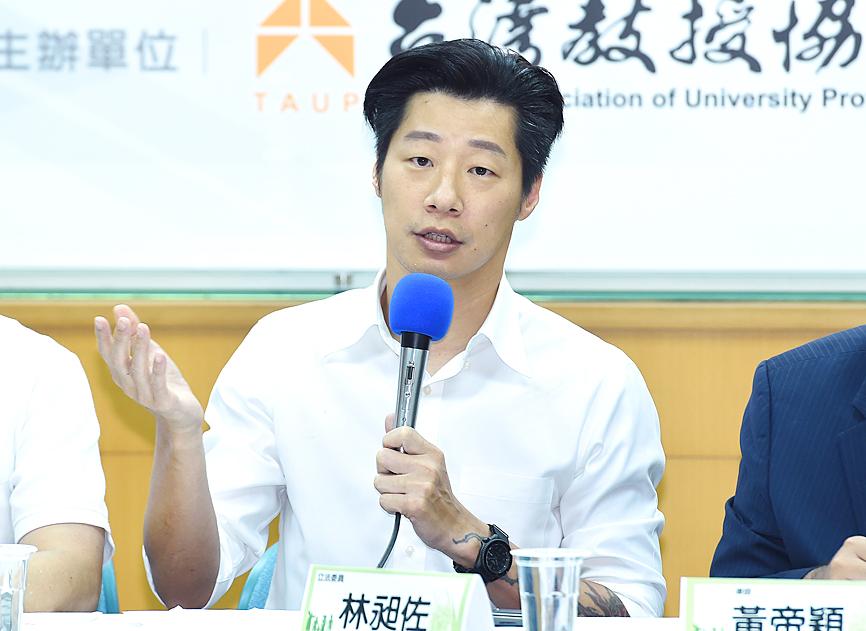Legal experts and representatives of political parties yesterday accused the Taiwan High Administrative Court of aiding China in its “united front” campaign against Taiwan, after it ruled against the Ministry of the Interior, which had fined 27 Taiwanese for working for local government offices in China.
The ruling runs counter to the prevailing public view regarding the protection of Taiwan’s sovereignty, as the public and lawmakers strongly support enhancing national security measures to combat China’s disinformation campaigns and “united front” tactics, attorney Huang Di-ying (黃帝穎) said, adding that the ruling undermines these efforts.
Huang, along with legal experts and academics from the Taiwan Association of University Professors (TAUP), at a briefing yesterday urged the ministry to appeal the court’s ruling on Thursday last week.

Photo: Liao Chen-huei, Taipei Times
The 27 defendants had been fined NT$100,000 each for working as assistants to the heads of local community management committees.
In 2018, the defendants took up the jobs mainly in Xiamen in China’s Fujian Province. They had collectively signed a work contract brokered by a private company, but their wages were reportedly paid by Xiamen’s municipal agencies.
Huang said that the ministry must appeal the ruling, because the case had contravened the Act Governing Relations Between the People of the Taiwan Area and the Mainland Area (臺灣地區與大陸地區人民關係條例), which prohibits Taiwanese from holding a position or becoming a member of political party, military unit or government agency in China.
Although the ruling was based on the defendants’ right to work and their freedom to choose a job, Huang said that the judges had overextended their reach by ignoring the law, while China has threatened Taiwan with an invasion.
Independent Legislator Freddy Lim (林昶佐), pointing to the recent approval of the Anti-Infiltration Act (反滲透法) and bills that were amended to bolster Taiwan’s national security against threats from China, said that the ruling should not have superseded laws passed in the Legislative Yuan.
The contract signed by the 27 Taiwanese reportedly also said that they must abide by the so-called “1992 consensus” and adhere to the “one China” principle.
Lim said that “the ruling would permit our citizens to work for an enemy state,” which has would to go to war to annex Taiwan.
“We really must question this decision,” he said.
Huang said the ruling showed the failure of the government’s push for judicial reform, as the Taiwan High Administrative Court had in the past few years years made rulings that went against the public’s expectations.
“It is time for the Judicial Yuan to educate these judges, as they seem to be stuck in the era of a one party-state regime,” Huang said.
The so-called “1992 consensus,” a term former Mainland Affairs Council chairman Su Chi (蘇起) in 2006 admitted making up in 2000, refers to a tacit understanding between the Chinese Nationalist Party (KMT) and the Chinese Communist Party that both sides of the Taiwan Strait acknowledge there is “one China,” with each side having its own interpretation of what “China” means.

Taiwanese can file complaints with the Tourism Administration to report travel agencies if their activities caused termination of a person’s citizenship, Mainland Affairs Council Minister Chiu Chui-cheng (邱垂正) said yesterday, after a podcaster highlighted a case in which a person’s citizenship was canceled for receiving a single-use Chinese passport to enter Russia. The council is aware of incidents in which people who signed up through Chinese travel agencies for tours of Russia were told they could obtain Russian visas and fast-track border clearance, Chiu told reporters on the sidelines of an event in Taipei. However, the travel agencies actually applied

Japanese footwear brand Onitsuka Tiger today issued a public apology and said it has suspended an employee amid allegations that the staff member discriminated against a Vietnamese customer at its Taipei 101 store. Posting on the social media platform Threads yesterday, a user said that an employee at the store said that “those shoes are very expensive” when her friend, who is a migrant worker from Vietnam, asked for assistance. The employee then ignored her until she asked again, to which she replied: "We don't have a size 37." The post had amassed nearly 26,000 likes and 916 comments as of this

New measures aimed at making Taiwan more attractive to foreign professionals came into effect this month, the National Development Council said yesterday. Among the changes, international students at Taiwanese universities would be able to work in Taiwan without a work permit in the two years after they graduate, explainer materials provided by the council said. In addition, foreign nationals who graduated from one of the world’s top 200 universities within the past five years can also apply for a two-year open work permit. Previously, those graduates would have needed to apply for a work permit using point-based criteria or have a Taiwanese company

The Shilin District Prosecutors’ Office yesterday indicted two Taiwanese and issued a wanted notice for Pete Liu (劉作虎), founder of Shenzhen-based smartphone manufacturer OnePlus Technology Co (萬普拉斯科技), for allegedly contravening the Act Governing Relations Between the People of the Taiwan Area and the Mainland Area (臺灣地區與大陸地區人民關係條例) by poaching 70 engineers in Taiwan. Liu allegedly traveled to Taiwan at the end of 2014 and met with a Taiwanese man surnamed Lin (林) to discuss establishing a mobile software research and development (R&D) team in Taiwan, prosecutors said. Without approval from the government, Lin, following Liu’s instructions, recruited more than 70 software